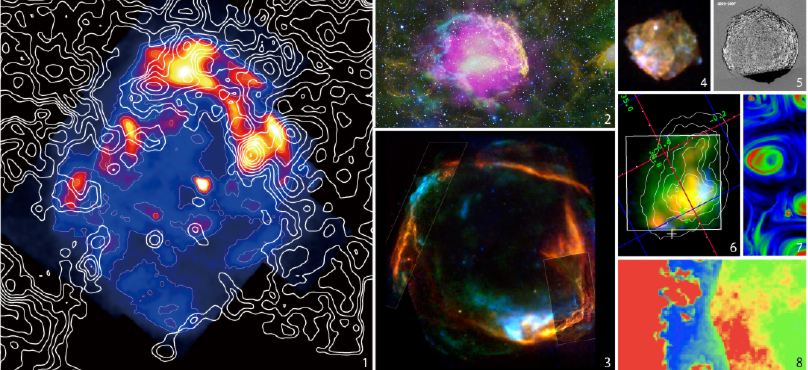Home
Scientific rationale
Supernova remnants (SNRs) are the most energetic objects in the Galactic disk, and have been observed at various wavelengths from radio to γ rays. One of the most spectacular features of SNRs is the fast moving expanding shells whose velocity is measured to be 3000-5000 km s^-1. Recent observations of the shells in X rays as well as radio continuum emission have provided a wealth of information on their physical/kinematical properties. It is also remarkable that the dense interstellar medium interacting with the shells is likely playing a key role to produce X rays and γ rays as shown by comparisons with HI/CO and dust emission. Theoretical works on cosmic-ray acceleration/escaping in SNRs are unveiling details of cosmic-ray acceleration/propagation by magneto-hydro-dynamical numerical simulations which will be compared with observations. In this 2-day workshop, we invite observers and theorists in order to stimulate active interaction and exchange of ideas on SNRs.
Hidetoshi SANO
Designated Assistant Professor
Institute for Advanced Research, Nagoya University
SOC
Hidetoshi Sano (Nagoya University)
Yasuo Fukui (Nagoya University)
Image credit
1. SNR RX J1713 Suzaku X-ray image superposed with the NANTEN2 CO contours (Sano et al. 2013, ApJ, 778, 59).
2. SNR IC443 composite image (NASA/DOE/Fermi LAT Collaboration, NOAO/AURA/NSF, JPL-Caltech/UCLA).
3. SNR RCW 86 X-ray image (Chandra: NASA/CXC/Univ. of Utrecht/J.Vink et al.; XMM-Newton: ESA/Univ. of Utrecht/J.Vink et al. ).
4. Magellanic SNR N49 (NASA/CXC/Caltech/S.Kulkarni et al.).
5. Difference X-ray image between 2000 and 2007 observations toward Tyco’s SNR (Katsuda et al. 2010, ApJ, 709, 1387).
6. SNR W44 Suzaku X-ray image (Uchida et al. 2012, PASJ, 64, 141).
7. 2D PIC simulation of the SNR shocks (Ohira et al. 2009, ApJ, 698, 445).
8. 3D MHD simulation of the SNR shocks Propagating into the inhomogeneous ISM (Shimoda et al. 2015, ApJ, 803, 98).
